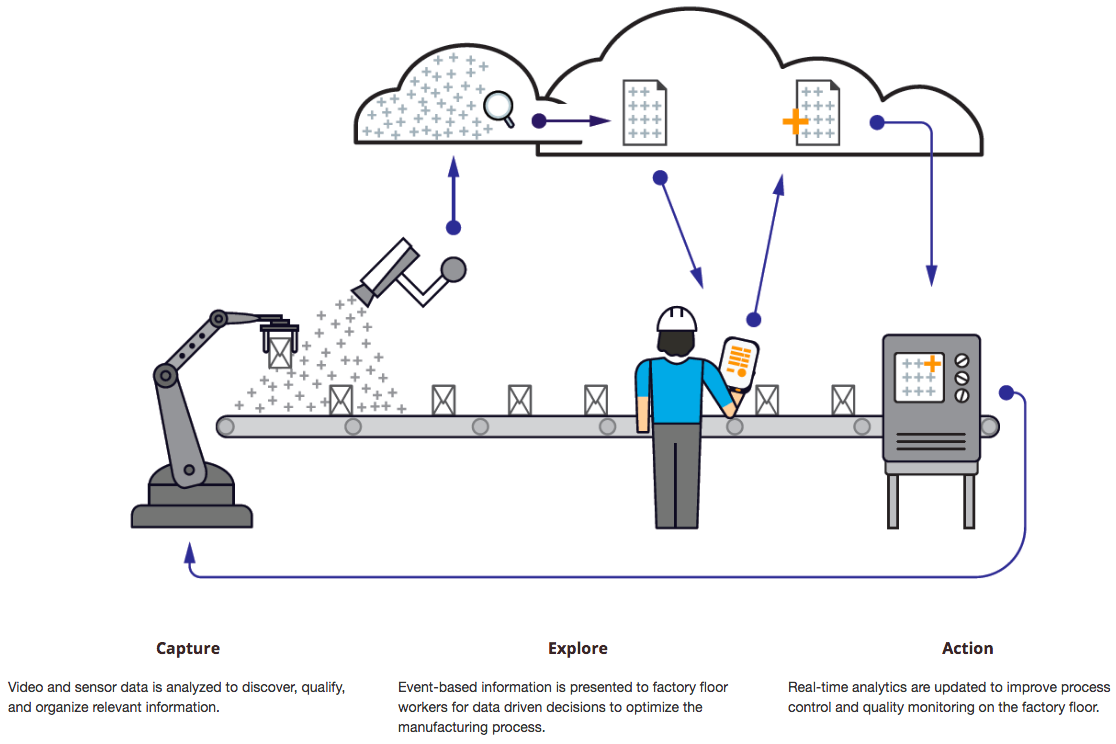This is part of a series on machine intelligence companies. We’ve interviewed Beagle, Mariana, Beyond Verbal, and Preteckt. Now we’re excited to feature Eigen Innovations, which is applying AI and machine learning to industrial manufacturing.
Eigen Innovations, a Canadian company, uses artificial intelligence and machine learning to help customers monitor their industrial equipment and optimize manufacturing operations.
We recently talked to Eigen’s chief executive officer Scott Everett about the inspiration behind the company, how its core Intellexon® platform works, current trends and limitations in machine learning, and more.
[Editor’s note: The interview questions and responses below have been edited for clarity and length.]
What does your role as CEO entail on a day-to-day basis?
We develop solutions for the industrial market, helping manufacturers to maximize the efficiency of their production operation using real-time advanced computing solutions.
What I love about that is my day-to-day can involve everything from walking a factory floor to talking about deep learning algorithms with our data scientists.
Being the CEO, I am consumed with the single focus of creating value for customers and in turn creating value for the company. Each day is different in pursuit of that.
What is your educational background and prior work experience?
My background is in engineering. I earned a Bachelors and Masters in Mechanical Engineering, specializing in advanced controls and machine learning.
I’ve spent a lot of time in steel-toe boots and a hard hat, working in industrial environments, and seeing opportunities to improve process control and advance industrial automation. These experiences led me to research how artificial intelligence could be leveraged to achieve new efficiency breakthroughs.
Working on a thesis in that field led to a patent in optimization of complex systems and to the founding of Eigen.

What factors led you to found Eigen?
One of my favorite books is Pirsig’s Zen and the Art of Motorcycle Maintenance. There’s a mystical side to how humans and machines intersect to become something greater. But it is achieved through understanding and control.
I founded Eigen because of a passion for technology and a passion for working with people to use technology for new and innovative solutions.
I think to the general public, there’s a lot of mystery about concepts like machine learning and artificial intelligence. Putting those concepts to use in an industrial environment forces you to open the black box and make solutions that are usable, understandable, and leave people in control.
What’s the most challenging aspect of your role?
As the CEO, you’re constantly having to make trade-offs. By nature, it’s hard for me to say “no.” I’m curious about everything.
So the biggest challenge is in deciding what not to do.

What was the inspiration behind Eigen’s Intellexon® software?
We firmly believe that the best experts in any process are the people operating the process.
However, any one person’s scope of expertise is limited to what’s in front of them day-to-day, regardless of what level they are at within the organization.
At Eigen, we see a way to tap into the collective expertise of the factory floor, learn from the individual operators, and look for ways to augment the overall intelligence of the factory using the Intellexon® platform to track and learn from events across disparate parts of the manufacturing process.
How do you utilize machine learning to improve the manufacturing process?
We provide a continuous learning platform that integrates video and sensor data. It enables factory floor workers to explore data in real-time to make data-driven decisions that directly improve the manufacturing process.
The platform has a machine learning engine that combines the data captured from the factory floor with the input captured from users, in order to learn optimizations that can improve process control and quality monitoring directly on the factory line.

How does your customers’ quality inspection process change after implementing your product?
Most systems on the market rely on humans to manually program every variation of pattern and anomaly to detect during inspection.
Leveraging a machine learning engine, we are able to use a fraction of user input to realize massive gains in efficiency and accuracy of detection not possible to achieve in a manual way.
Most customers move from an “end-of-shift” destructive testing regime to a real-time inspection process for defect avoidance.
In addition, the platform inherently allows users to workflow events as they happen, increasing the collaboration, time to resolution, and collective knowledge of the factory.
How would you define Eigen’s key value proposition for customers?
We really enable manufacturers to protect their main asset, which is their end product.
Everything about a customer, their brand, the efficiency of their operation, the proper functioning of their equipment is all reflected in their end product.
Whether it’s through monitoring the equipment or process or inspecting product during the manufacturing operation, maximizing defect avoidance in a cost-effective and simple way is the main value proposition we obsess about delivering to our customers.

Where do you operate?
Our primary market is North America, with customers throughout Canada and the United States. But we have had sales in Europe, as well.
In any sale, we work closely with our customers and ensure that the system fits in to whatever process or standard is required.
We are experts at defect avoidance, and it’s that value that customers are after primarily.
Was the Intellexon® software fully designed and developed in-house?
We have a full staff comprised of operational technologists, IT software developers, and data scientists. The entire solution has been designed and developed by the Eigen team.
We have leveraged open sourced code for frameworks and for some platform connectivity where it makes sense for efficiency. However, the main algorithms used for learning feature detection, contour analysis, and ultimately anomaly detection were developed in-house.

How much training data is needed to train models and deploy your platform for a new customer?
It largely depends on the complexity of the process, and what type of expertise or intelligence we’ve already developed for an application.
We normally get in to continuous real-time inspections, processing data from a very dynamic environment or application.
The amount of data is less important than the variation of data.
So we may record for a day or two simply to ensure we trap significant variations in data. But we would then cluster and identify important or suspicious data that very quickly reduces and focuses the data set.
This is an iterative process, giving the user transparency to decide what’s important and what not to focus on, leaving the customer largely in control of the training time.
What’s the most exciting trend in machine learning from Eigen’s perspective?
It’s less about specific advances or new technologies that are being developed and more about the increased awareness and acceptance of machine learning and artificial intelligence as a whole.
I think we are on the cusp of a tipping point that is very exciting. At Eigen, “data science” isn’t a disconnected endeavor, it’s part of our mainline R&D activity.
I’m seeing this trend in the industry, where businesses are simply incorporating the disciplines of data science into their day-to-day operation.
What advances in machine learning have benefitted Eigen the most?
Delivering on our value proposition requires processing large amounts of data in real-time and creating a finely-tuned algorithm to do that directly on the factory floor, at the edge of a network.
We are benefiting from advances in machine learning, especially the ability to use big data analytics and deep learning algorithms to come up with client-specific solutions that improve the performance of their processes rapidly and accurately.
Are there any limitations on machine learning Eigen would like to see removed?
I think the limitations we see are related to practicality of solutions with the given resources.
We are moving beyond theory in much of the field, where the potential is only limited by the processing performance.
We will see a day when advanced concepts in deep learning will be able to execute on much smaller footprints, like mobile devices. I’m sure Moore’s Law will benefit from this increased adoption and ubiquity.
Have there been any instances where machine learning led to a false positive or negative for your customers?
Most customers go through a “training” period with the system where it is not a closed loop to their production operation until they are confident in its performance.
During this time, operators tell the system when an event is incorrectly categorized. By providing this input to the learning platform, its accuracy improves continuously and rapidly.
This is a transparent process, and only once the customer is confident in the performance is it put online to automate the production in real-time.
This significantly reduces occurrences of false positives or negatives in actual production.
Does Eigen actually consider itself a machine intelligence company?
If we had to categorize ourselves, it’s probably as a product company, specializing in advanced software solutions for industrial manufacturing.
That said, we think of ourselves as an “Augmented Intelligence” company, helping manufacturers bridge the factory floor big data with the collective expertise of operators to achieve untapped efficiencies in production operation.
This post is part of a series of interviews with machine intelligence companies that are harnessing the power of machine learning and artificial intelligence in innovative ways. Stay tuned for more!

